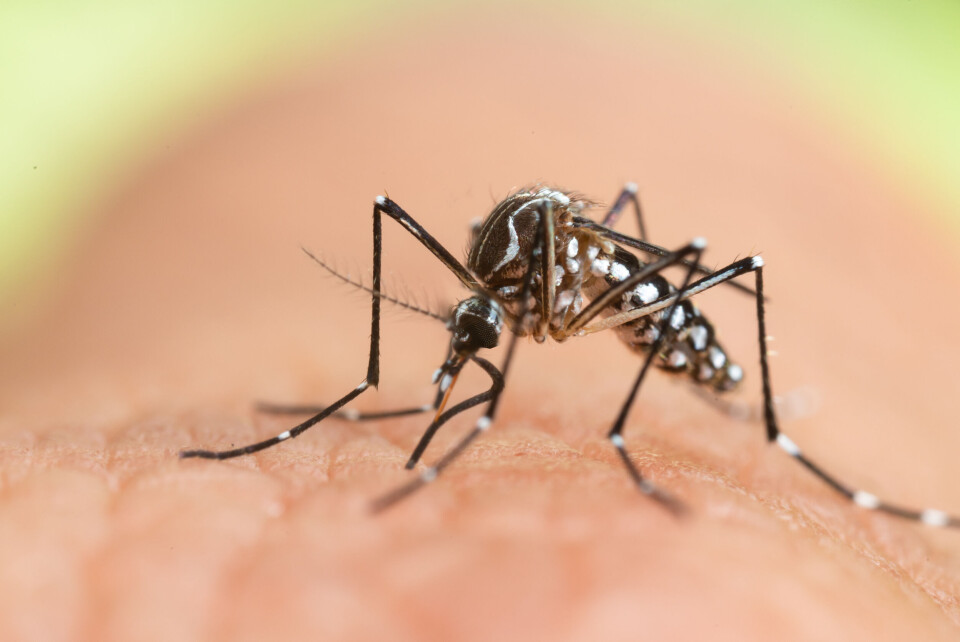-
New Paris-Jersey direct flight to launch this summer
Loganair route forms part of Channel Island’s tourism boost plan
-
Death of right-wing protester in Lyon sparks fears of further political violence
Quentin D, 23, died after reportedly being ambushed by far-left activists near site of political conference
-
Red flood alerts continue in south-west - and more heavy rain expected
Garonne river is particularly affected. French weekly weather forecast February 16 - 20
Mosquitoes make their return in France: Tips on keeping them away
The insects, of which there are 70 different species in the country, are back slightly earlier this year

Mosquito season is back in France as warm weather arrives, with higher temperatures, humidity, and stagnant water the main drivers for the irritating insects.
Read more: Do May’s high temperatures indicate a hot summer ahead?
The season has started slightly early this year, said Frédéric Simard, a researcher at the IRD (Institute of Research for Development) in Montpellier. He told Actu.fr: “Nature is a little more in advance this year with rather mild and humid weather, so the insects are coming back.”
Anna-Bella Failloux, entomologist (insect expert) at the Institut Pasteur, told La Dépêche: “It’s normal to have mosquitoes during this season. The presence of mosquitoes is related to the temperature and the amount of standing water.”
She added that the type of mosquito and the number can vary considerably from region to region, with around 70 different species present in France, only some of which bite.
Tiger mosquitoes, which are large and identifiable by the black and white marks on their bodies, were first seen in the south, but are now present across 67 departments in France. They are thought to be among the more dangerous, as they can carry diseases such as dengue, zika, and chikungunya.
However, it should be noted that it is unlikely to contract one of these diseases through mosquitoes.
Tiger mosquitoes are one of the more dominant species in the country, especially in Occitanie. You can use this website to find out more about mosquitoes and alerts in France.
Read more: 64 French departments on red alert for tiger mosquitoes
Ms Falloux said: “[The tiger mosquito] arrived in France in 2004, and as time goes by it is climbing its way up to the north of the country. This is because the climate allows it, and because it is a mosquito that is hyper-adapted to humans, which means that it will move along with them with transport.”
Tiger mosquitoes are especially common in areas with lots of standing water, such as in plastic outdoor containers, blocked gutters, and flower pot stands, the expert said.
She added that getting rid of standing water in your garden and outdoor spaces is a “civic action”, and said that “if everyone makes an effort, we will have fewer mosquitoes”.
Mr Simard agreed, saying: “Everything is linked to the presence of water.”
The season usually begins around May, and can last until the end of November (or even longer) in some areas.
Ms Falloux explained: “In the southeast of France, for example, there are mosquitoes almost all year round. This is due to a winter that is not especially cold, which means that the mosquitoes do not die, but enter into a kind of dormant state, meaning low activity.
“They will continue in areas with stable temperatures, especially in cellars, and wait for more clement temperatures.”
A study by the IRD and the Pasteur Institute in Bangui, Central African Republic, found that between 70-80% of mosquito bites happen at night.
To avoid insect bites as much as possible, people are advised to:
- Remove any standing water outdoors promptly and check for any places it could be hidden
- Use anti-mosquito products that include Deet, IR 3535, KBR 3023, or citriodiol
- Wear covering clothing where possible
- Avoid sitting outside for too long when mosquitoes are present
- Use a net when sleeping if preferred
Garden insecticides are not considered to be effective as many mosquitoes have become resistant to these products, said researcher Mr Simard.
He also said that anti-mosquito bracelets and citronella are generally not as effective as the anti-mosquito products listed above.
New ‘breathing’ devices help to trap mosquitoes
A company called Qista has created a device which imitates human respiration to attract female mosquitoes – the only ones that bite – and trap them.
Developed near Arles (Provence-Alpes-Côte d’Azur), the trap releases carbon dioxide and other molecules contained in human breath, and the mosquito moves towards it.
When it is caught in the device, “it is prevented from laying 200 eggs every 48 hours,” said Qista’s co-founder, Pierre Bellagambi. “There are fewer eggs and therefore fewer bites.”
This also means that there is less collateral damage to other insect species, as only female mosquitoes and a few other insects which feed on blood are attracted.
“In the 2010s, larvicide products authorised for getting rid of insects – even the ecological ones – had a harmful impact on insectivore creatures,” Mr Bellagambi said.
The new trap has been tested in Camargue, where a notable decline in the number of mosquitoes has been observed, with the regularity of bites dropping from 15 every 10 minutes to one every 10 minutes.
Related articles
Mosquitoes in France: A scientist's advice for keeping them away
France on alert for tiger mosquitoes as temperatures rise
Drones can control spread of tiger mosquitoes, French study finds
























